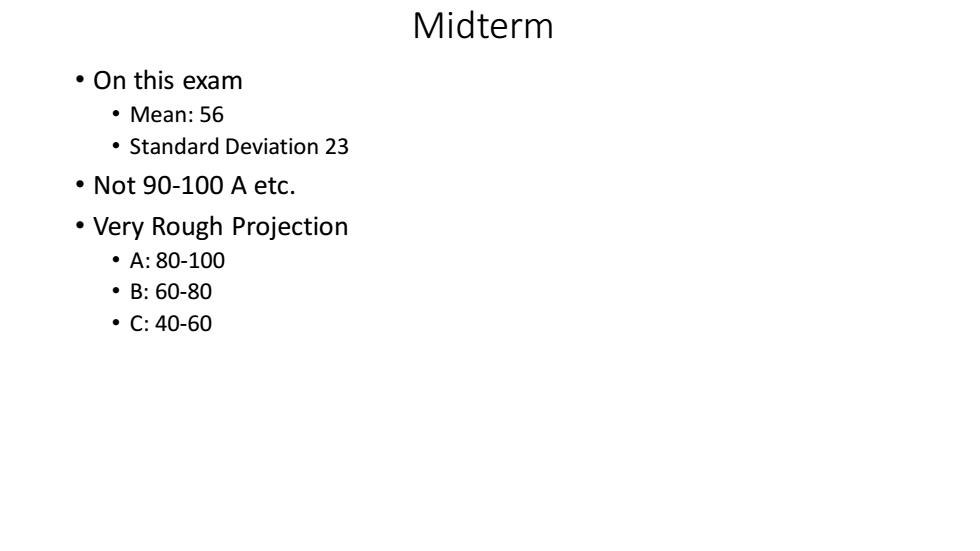
Midterm ·On this exam ·Mean:56 Standard Deviation 23 ·Not90-100Aetc. Very Rough Projection ·A:80-100 ·B:60-80 ·C:40-60
Midterm • On this exam • Mean: 56 • Standard Deviation 23 • Not 90-100 A etc. • Very Rough Projection • A: 80-100 • B: 60-80 • C: 40-60
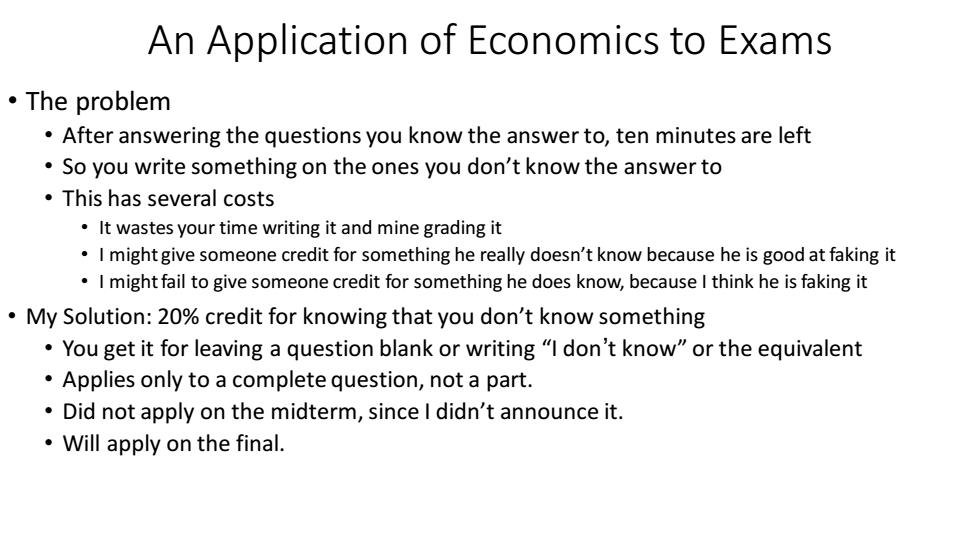
An Application of Economics to Exams 。The problem After answering the questions you know the answer to,ten minutes are left So you write something on the ones you don't know the answer to This has several costs It wastes your time writing it and mine grading it I might give someone credit for something he really doesn't know because he is good at faking it I might fail to give someone credit for something he does know,because I think he is faking it My Solution:20%credit for knowing that you don't know something You get it for leaving a question blank or writing "I don't know"or the equivalent Applies only to a complete question,not a part. Did not apply on the midterm,since I didn't announce it. Will apply on the final
An Application of Economics to Exams • The problem • After answering the questions you know the answer to, ten minutes are left • So you write something on the ones you don’t know the answer to • This has several costs • It wastes your time writing it and mine grading it • I might give someone credit for something he really doesn’t know because he is good at faking it • I might fail to give someone credit for something he does know, because I think he is faking it • My Solution: 20% credit for knowing that you don’t know something • You get it for leaving a question blank or writing “I don’t know” or the equivalent • Applies only to a complete question, not a part. • Did not apply on the midterm, since I didn’t announce it. • Will apply on the final
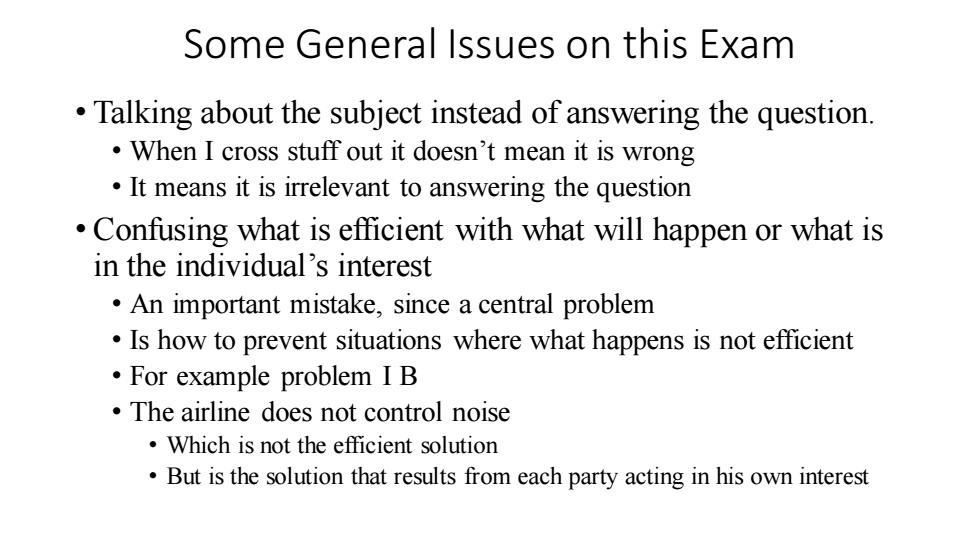
Some General Issues on this Exam Talking about the subject instead of answering the question. When I cross stuff out it doesn't mean it is wrong It means it is irrelevant to answering the question Confusing what is efficient with what will happen or what is in the individual's interest An important mistake,since a central problem Is how to prevent situations where what happens is not efficient For example problem I B The airline does not control noise Which is not the efficient solution But is the solution that results from each party acting in his own interest
Some General Issues on this Exam • Talking about the subject instead of answering the question. • When I cross stuff out it doesn’t mean it is wrong • It means it is irrelevant to answering the question • Confusing what is efficient with what will happen or what is in the individual’s interest • An important mistake, since a central problem • Is how to prevent situations where what happens is not efficient • For example problem I B • The airline does not control noise • Which is not the efficient solution • But is the solution that results from each party acting in his own interest
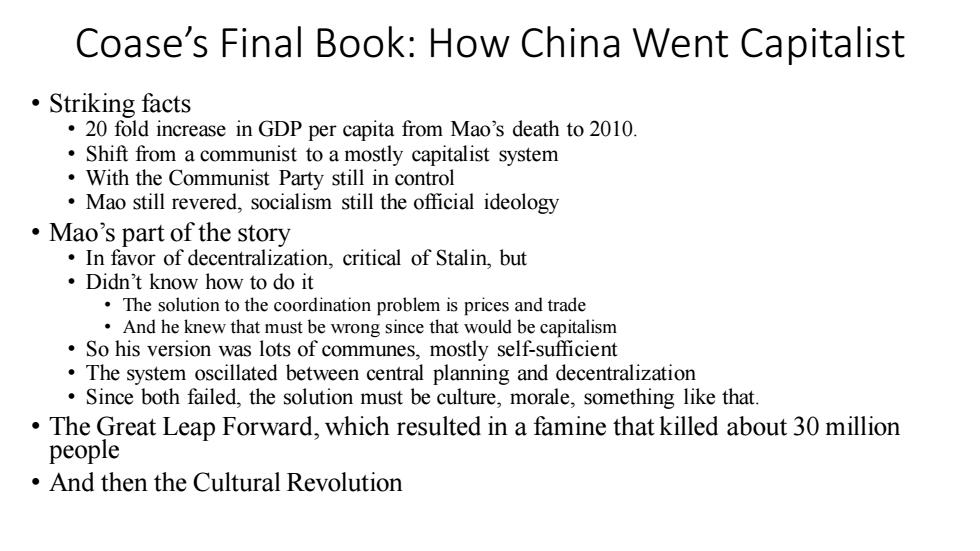
Coase's Final Book:How China Went Capitalist 。Striking facts 20 fold increase in GDP per capita from Mao's death to 2010. Shift from a communist to a mostly capitalist system With the Communist Party still in control Mao still revered,socialism still the official ideology Mao's part of the story In favor of decentralization,critical of Stalin,but Didn't know how to do it The solution to the coordination problem is prices and trade And he knew that must be wrong since that would be capitalism So his version was lots of communes,mostly self-sufficient The system oscillated between central planning and decentralization Since both failed,the solution must be culture,morale,something like that The Great Leap Forward,which resulted in a famine that killed about 30 million people And then the Cultural Revolution
Coase’s Final Book: How China Went Capitalist • Striking facts • 20 fold increase in GDP per capita from Mao’s death to 2010. • Shift from a communist to a mostly capitalist system • With the Communist Party still in control • Mao still revered, socialism still the official ideology • Mao’s part of the story • In favor of decentralization, critical of Stalin, but • Didn’t know how to do it • The solution to the coordination problem is prices and trade • And he knew that must be wrong since that would be capitalism • So his version was lots of communes, mostly self-sufficient • The system oscillated between central planning and decentralization • Since both failed, the solution must be culture, morale, something like that. • The Great Leap Forward, which resulted in a famine that killed about 30 million people • And then the Cultural Revolution
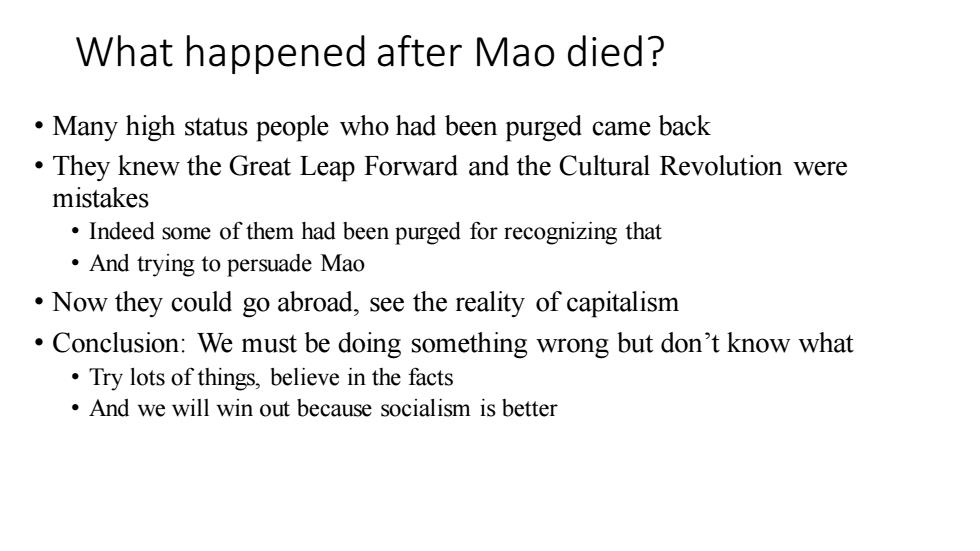
What happened after Mao died? Many high status people who had been purged came back They knew the Great Leap Forward and the Cultural Revolution were mistakes Indeed some of them had been purged for recognizing that And trying to persuade Mao Now they could go abroad,see the reality of capitalism Conclusion:We must be doing something wrong but don't know what Try lots of things,believe in the facts And we will win out because socialism is better
What happened after Mao died? • Many high status people who had been purged came back • They knew the Great Leap Forward and the Cultural Revolution were mistakes • Indeed some of them had been purged for recognizing that • And trying to persuade Mao • Now they could go abroad, see the reality of capitalism • Conclusion: We must be doing something wrong but don’t know what • Try lots of things, believe in the facts • And we will win out because socialism is better